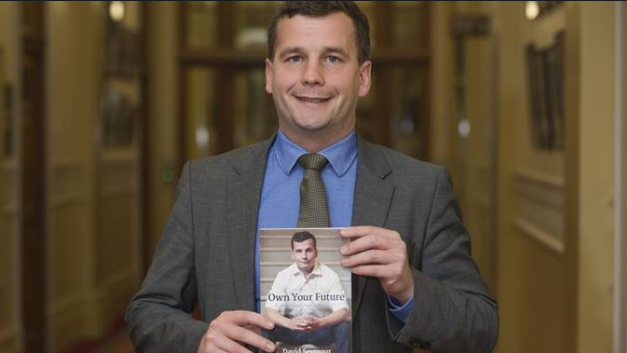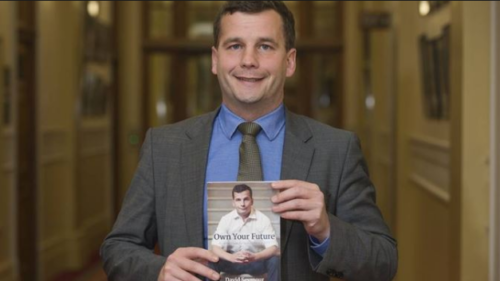This reading carries on from here.
The eleventh, and final, chapter in Own Your Future is ‘Treaty of Waitangi’. Given eight pages at the back of the book, it’s hard to imagine that Seymour takes this issue very seriously. One gets the feeling that it will be a quick virtue signal with one quiet mention of the Resource Management Act and that would be it.
He starts with a story about how the elders at the Te Tii Marae preferred him to the Green Party MPs at a Waitangi gathering on account of that he knew his Ngapuhi genealogy. Dismissing the Green MPs as “up themselves”, he is very much the hero of this story.
True to form, he then launches into the virtue signalling, being careful to place a macron over the a in ‘Maori’ and pushing a warm, fuzzy, globohomo vibe about how much he loves Maori culture. Seymour comes across as revoltingly dishonest and shallow here, considering that his ACT Party supported the Fifth National Government in its destruction of the Maori people. Politicians demand to be judged on their words, not their actions, like all hypocrites.
What Seymour writes here isn’t unreasonable on the face of it. It’s certainly true that many of the land confiscations made by the New Zealand Government were done so on spurious grounds, often outright false, and it is not reasonable for the beneficiaries of this process to get away with it scot free.
The problem is that the same logic can justify a great many other things. What Seymour and his kind like to call “profit”, others like to call “wage theft”. So if it’s true that “if you take something that is not yours, you should give it back” – which is apparently an ACT Party principle – then are the New Zealand working class owed some of their past production that was taken off them in the form of company profits? Why are wages dwindling relative to the cost of living? Seymour doesn’t seems to care about that side of things.
Indeed, the first mention of the RMA comes four pages in. Here, Seymour objects to the idea that local iwis might be allowed to object to land developments under the RMA. This, he cautions, leads to the possibility of Maoris being given a special class of citizenship. So Seymour is happy to virtue signal about how important Maoris and Maori culture are, he just doesn’t want to pay anything extra for it.
Laying down his neoliberal credentials harder than anywhere else in the book, Seymour declares that “New Zealand at its best” can be found at a citizenship swearing-in ceremony, where a bunch of people from other nationalities can be found “uniting as true Kiwis”. Not for Seymour the argument that a true Kiwi is someone who has roots in the country, or someone who can tell stories about his ancestors and their childhoods in the country. Kiwiness is merely another commodity to be bought and sold.
We could bet money that Seymour would profoundly disagree with this article about how being a Kiwi is a matter of the depth of one’s roots in the country.
He is, however, correct when he points that that Maoris have not actually benefit from all the special treatment of the last decades, and in some major measures (such as home ownership) have actually lost ground. He further makes a good point when he mentions that the problems faced by Maoris are the same problems as faced by all New Zealanders to a greater or lesser extent.
In summary, Own Your Future is a terrifying vision of how money and virtue signalling can matter more than heritage, blood links or any other basis for solidarity. David Seymour is the High Priest of New Zealand Neoliberalism, proudly carrying on the ACT tradition of valuing money more than people. He follows Rodney Hide, Richard Prebble and Roger Douglas in the ideology that everything in the nation can be packaged up and bought and sold for cash, people just as well as timber and lamb chops.
In this sense, he is unrepentant: he believes that New Zealand has a moral obligation to take care of foreign refugees out of general taxation money, but has no such moral obligation to take care of its own poor, even though many of them were created by the horrors of neoliberalism, the very same political philosophy he espouses in this book. Own Your Future stands out, even by the standards of political treatises, as an example of absolutely shameless virtue signalling.
Despite this, he makes several very good points about government overreach, especially with regards to its failed War on Drugs. He isn’t wrong when he points out that unnecessary taxation sucks energy unnecessarily from people, and although Seymour could never be a Georgist, he is correct when he labours the link between capitalism, innovation and prosperity. Perhaps, for that reason, there is merit in having an ACT Party seat in Parliament.
*
If you enjoyed reading this essay, you can get a compilation of the Best VJMP Essays and Articles of 2017 from Amazon for Kindle or Amazon for CreateSpace (for international readers), or TradeMe (for Kiwis).



